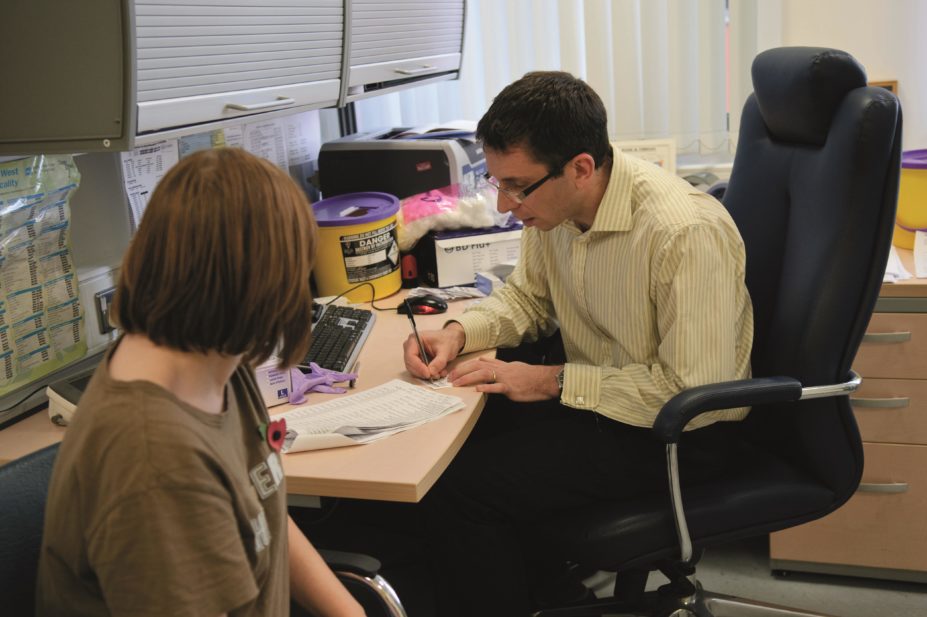
Stephen Barnes/Medical / Alamy
Information about a patient’s medicines should be shared by health and social care staff when that person moves from one care setting to another to support high-quality care, urges new guidance from England’s National Institute for Health and Care Excellence (NICE), published on 4 March 2015.
Adverse drug events represent a considerable burden on the NHS and have a significant impact on patients.
“When people transfer between different care providers, such as at the time of hospital admission or discharge, there is a greater risk of poor communication and unintended changes to medicines,” says the guidance. “When people move from one care setting to another, between 30% and 70% of patients have an error or unintentional change to their medicines.”
The guidance — ‘Medicines optimisation: the safe and effective use of medicines to enable the best possible outcomes’ — lists the information that should be shared when a person transfers between different care settings. These include the contact details of their GP, other contacts such their nominated community pharmacy, drug allergies, details of their medicines (including prescribed, over-the-counter and complementary medicines), how medicines are taken and what they are being taken for, and changes to medicines and dosages.
Other data that could be shared include when medicines should be reviewed, monitoring needs and any support a person needs to take their medicines.
Information about medicines should ideally be shared within 24 hours of the person being transferred, to ensure that patient safety is not compromised, NICE recommends. This should be done in the “most effective and secure way, such as by secure electronic communication, recognising that more than one approach may be needed”.
Commenting on the 24-hour target, Neal Patel, spokesperson for the Royal Pharmaceutical Society (RPS), the professional body for pharmacists, says: “This will only be possible with an electronic system of transfer of data between care settings and hopefully this recommendation will spur IT NHS investment into this area.”
The guidance also recommends that organisations should ensure that medicines reconciliation — a process that involves identifying any discrepancies with a person’s medicines — is carried out by a competent healthcare professional, ideally a pharmacist, pharmacy technician, nurse or doctor. In acute settings, this should happen within 24 hours or sooner if the person is admitted to hospital. In primary care, where people have been discharged from hospital, for instance, this should happen as soon as possible, before a prescription is issued and within one week of the GP practice receiving the information, the guidance says.
The guidance also says patients’ medication reviews may be led, for example, by a pharmacist.
“This recommendation provides further impetus for community pharmacists to access patient health records,” Patel says.
The guidance also wants organisations to consider using a number of methods to identify medicines-related patient safety incidents – for instance, health record review, patient surveys and direct observation of medicines administration. A report[1]
commissioned by the Department of Health found that 5–8% of unplanned hospital admissions are due to medication issues.
“The unacceptable level of medicines waste, estimated at £300m per year, means all health practitioners need to think differently about how medicines are used in the NHS,” says Liz Butterfield, the lead on medicines optimisation at the RPS’s English Pharmacy Board. “For people living with long-term conditions, a focus on best use of medicines throughout their lifetime, not just when diagnosed, will mean better care and health outcomes.”
Separately, the Association of the British Pharmaceutical Industry (ABPI) and NHS England have launched a number of roadshows to “improve patient outcomes through the benefits of pharmaceutical price regulation scheme and medicines optimisation”. The first one was held on 3 March 2015, and 13 more are planned in England.
The first roadshow was attended by a mix of stakeholders, including hospital and community pharmacists, pharmaceutical industry representatives, commissioners, GPs and patient groups. One of the key messages from the roadshow, says Butterfield, was that decision making about medicines must involve patients.


